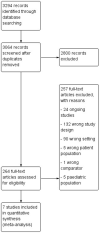Duration of the effectiveness of nicotine electronic cigarettes on smoking cessation and reduction: Systematic review and meta-analysis
- PMID: 35990084
- PMCID: PMC9386078
- DOI: 10.3389/fpsyt.2022.915946
Duration of the effectiveness of nicotine electronic cigarettes on smoking cessation and reduction: Systematic review and meta-analysis
Abstract
Background: The success of pharmacotherapies for smoking cessation in real-life remains limited, with a significant number of long-term relapses. Despite first promising results, the duration of the effectiveness of electronic cigarettes is still unknown. Our objective was to assess the duration of the effectiveness of electronic cigarettes on smoking cessation and reduction in daily smokers.
Methods: The databases EMBASE, Cochrane Central Register of Controlled Trials (CENTRAL), ClinicalTrials.gov and PUBMED were consulted until March 23, 2022. We selected only randomized controlled trials with daily adult smokers. The intervention was the nicotinic electronic cigarette vs. non-nicotine electronic cigarette or other validated pharmacotherapies (varenicline, bupropion and nicotine replacement therapy). The minimum duration of the intervention was 3 months, with a follow-up of at least 6 months. Two independent reviewers used the PRISMA guidelines. The primary endpoint was smoking cessation at the end of the intervention and follow-up periods confirmed by a reduction in expired CO < 10 ppm. The reduction was defined as at least 50% of the initial consumption or by a decrease of daily mean cigarette consumption at the end of the intervention and follow-up periods.
Results: Abstinence at the end of the intervention and follow-up periods was significantly higher in the nicotine electronic cigarette group, compared to nicotine replacement therapy (NRT) [respectively: RR: 1.37 (CI 95%: 1.32-2.93) and RR: 1.49 (CI 95%: 1.14-1.95)] and to the non-nicotine electronic cigarette condition [respectively: RR: 1.97 (CI 95%: 1.18-2.68) and RR: 1.66 (CI 95%: 1.01-2.73)]. With regard to smoking reduction, the electronic cigarette with nicotine is significantly more effective than NRT at the end of the intervention and follow-up periods [respectively RR: 1.48 (CI 95%: 1.04-2.10) and RR: 1.47 (CI 95%: 1.18-1.82)] and non-nicotine electronic cigarette in the long term [RR: 1.31 (CI 95%: 1.02-1.68)].
Conclusions: This meta-analysis shows the duration of the effectiveness of the nicotine electronic cigarette vs. non-nicotine electronic cigarette and NRT on smoking cessation and reduction. There are still uncertainties about the risks of its long-term use and its potential role as a gateway into smoking, particularly among young people.
Keywords: Electronic Nicotine Delivery Systems (ENDS); electronic cigarettes (E-cigarettes); serious adverse effects; smoking cessation; smoking reduction.
Copyright © 2022 Vanderkam, Bonneau, Kinouani, Dzeraviashka, Castera, Besnier, Binder, Doux, Jaafari and Lafay-Chebassier.
Figures
References
-
- Degenhardt L, Charlson F, Ferrari A, Santomauro D, Erskine H, Mantilla-Herrara A, et al. . The global burden of disease attributable to alcohol and drug use in 195 countries and territories, 1990–2016: a systematic analysis for the Global Burden of Disease Study 2016. Lancet Psychiatry. (2018) 5:987–1012. 10.1016/S2215-0366(18)30337-7 - DOI - PMC - PubMed
-
- Doll R, Peto R, Boreham J, Sutherland I. Mortality in relation to smoking: 50 years' observations on male British doctors. BMJ. (2004) 328:1519. 10.1136/bmj.38142.554479.AE - DOI - PMC - PubMed
Publication types
LinkOut - more resources
Full Text Sources



